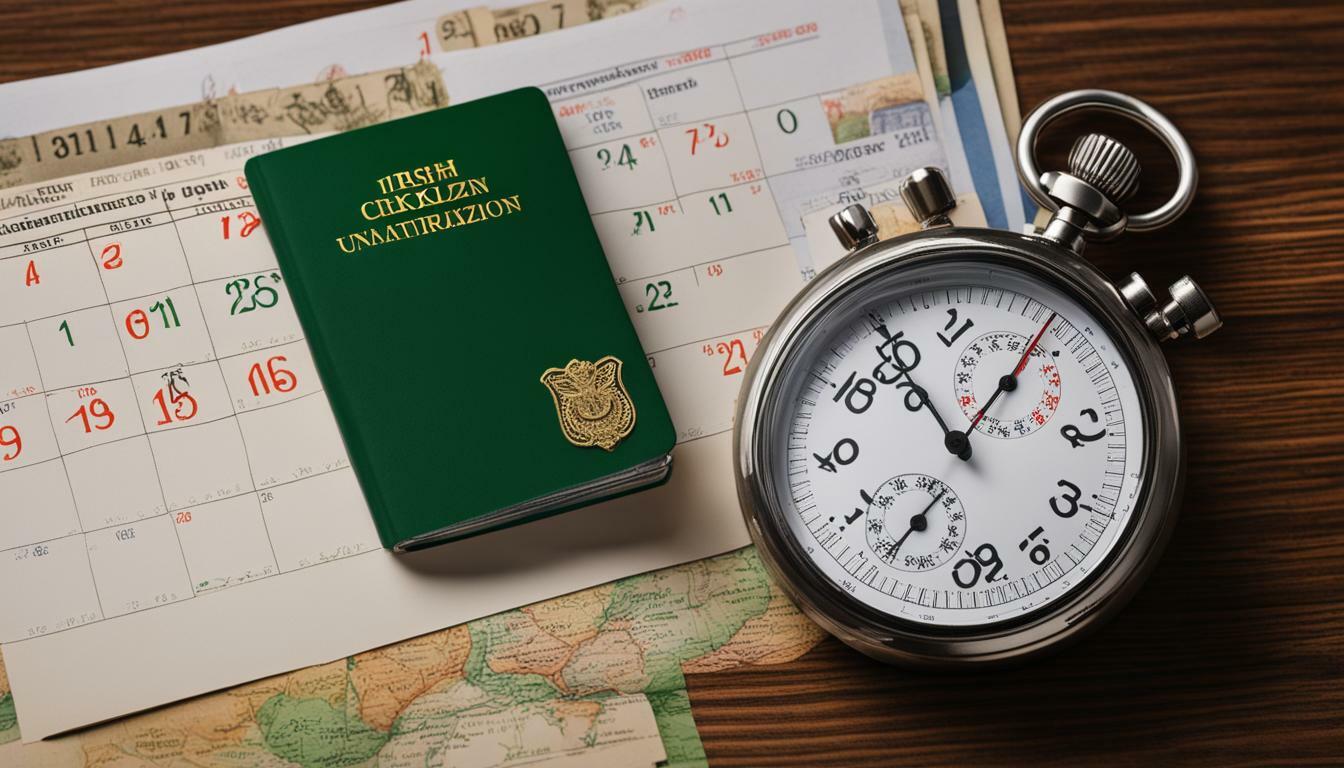How Long Does Naturalization Typically Take in Ireland? Find Out Now!
Naturalization in Ireland involves meeting specific requirements and going through a process with the Irish Naturalization and Immigration Service (INIS). Applicants must fulfill conditions such as age, good character, and residency requirements. They must have one year of continuous residence in Ireland before applying and a total of four years of residence in the eight years prior to the application. However, there are exceptions for certain categories of applicants, such as spouses of Irish citizens who can apply after three years of marriage and residency.
The Minister for Justice has the authority to waive certain conditions for naturalization, allowing for flexibility in exceptional circumstances. The processing time for applications submitted through the Foreign Births Register can take around nine months, but urgent requests can also be made in exceptional circumstances.
Key Takeaways:
- Naturalization in Ireland requires meeting age, good character, and residency requirements
- Applicants must have one year of continuous residence in Ireland and four years of residence in the eight years prior to the application
- Exceptions to residency requirements exist for certain categories of applicants, such as spouses of Irish citizens
- The Minister for Justice has the power to waive certain conditions for naturalization
- Processing time for applications through the Foreign Births Register is approximately nine months, with the possibility of making urgent requests in exceptional circumstances
Irish Citizenship Application Timeline
The application process for Irish citizenship follows a specific timeline that applicants need to be aware of. It involves several steps and can take some time to complete. Let’s take a closer look at the timeline for acquiring Irish citizenship.
- Step 1: Gather Required Documents and Information
- Step 2: Submitting the Application
- Step 3: Application Processing
- Step 4: Decision and Ceremony
Before beginning the application process, it is important to gather all the necessary documents and information. This may include proof of identity, evidence of residency, and other supporting documents. Having these prepared in advance can help streamline the overall timeline.
Once you have gathered all the required documents, the next step is to submit your application to the Irish Naturalization and Immigration Service (INIS). This can be done online or through a paper application. It is important to provide accurate and complete information to avoid any delays in the process.
After submitting your application, it will undergo a review process by the INIS. This includes verifying the information provided and conducting background checks. The processing time can vary, but it is important to note that it can take several months to receive a decision on your application.
Once a decision has been made on your application, you will be notified by the INIS. If your application is approved, you will then be invited to attend a citizenship ceremony where you will take an oath of fidelity to the Irish nation and receive your certificate of naturalization.
It is important to note that the timeline for acquiring Irish citizenship may vary depending on individual circumstances and any additional requirements or exceptions that may apply. The processing time can also be influenced by factors such as the volume of applications and the complexity of individual cases.
By understanding the timeline and following the necessary steps, applicants can navigate the process more smoothly and increase their chances of acquiring Irish citizenship within a reasonable timeframe.
| Step | Description |
|---|---|
| 1 | Gather Required Documents and Information |
| 2 | Submit Application to the INIS |
| 3 | Application Processing |
| 4 | Decision and Ceremony |
Residency Requirements for Irish Naturalization
To become an Irish citizen, applicants must meet specific residency requirements set by the Irish government. These requirements are designed to ensure that individuals seeking Irish citizenship have a genuine connection to the country and have contributed positively to Irish society.
One of the key residency requirements is a period of continuous residence in Ireland for one year immediately before the date of application. This means that applicants must have been living in Ireland for at least 12 months prior to applying for citizenship. Additionally, applicants must have a total of four years of residence in the eight years preceding the application.
It’s important to note that there are exceptions to these residency requirements for certain categories of applicants. For example, spouses of Irish citizens can apply for citizenship after three years of marriage and three years of residency in Ireland. This recognizes the special circumstances of individuals who are married to Irish citizens and have established a long-term connection to the country.
The Minister for Justice also has the power to waive certain conditions for naturalization. This means that in exceptional circumstances, such as humanitarian reasons or other compelling factors, individuals may be granted Irish citizenship even if they do not meet the standard residency requirements.
| Residency Requirements | Duration |
|---|---|
| Continuous residence in Ireland | 1 year |
| Total residence in the 8 years preceding application | 4 years |
| Exceptions for spouses of Irish citizens | 3 years of marriage and 3 years of residency |
Overall, meeting the residency requirements is an essential step in the naturalization process in Ireland. By demonstrating a genuine commitment to the country and fulfilling the required period of residence, applicants can take a significant step towards becoming Irish citizens.
Exceptions to Residency Requirements
While the general residency requirements for Irish naturalization are strict, there are exceptions for certain individuals such as spouses of Irish citizens. These individuals may apply for Irish citizenship after three years of marriage and three years of residency in Ireland. This exception recognizes the close familial relationship and commitment to Ireland that comes with being the spouse of an Irish citizen. It provides a pathway for these individuals to become Irish citizens in a shorter timeframe than the standard residency requirements.
Additionally, individuals who have resided outside of Ireland while working for the Irish government, including members of the Irish Defence Forces and Irish diplomats, may also be eligible for exceptions to the residency requirements. This recognizes their service to Ireland and the unique circumstances of their employment abroad. The Minister for Justice has the authority to waive certain conditions for naturalization, including residency requirements, on a case-by-case basis.
Exception to Residency Requirements Table:
| Category | Residency Requirement |
|---|---|
| Spouse of an Irish citizen | 3 years of marriage and 3 years of residency |
| Irish government employees | Waiver of residency requirement by Minister for Justice |
It’s important to note that these exceptions are not applicable to all individuals seeking Irish naturalization. Most applicants will need to fulfill the standard residency requirements of one year of continuous residence in Ireland before the date of application and a total of four years of residence in the eight years prior to the application. However, the exceptions provide flexibility for certain categories of applicants, making the naturalization process more accessible to them.
Ministerial Power to Waive Conditions
The Minister for Justice in Ireland has the power to waive specific conditions for naturalization based on individual circumstances. This means that in exceptional cases, certain requirements can be exempted, allowing applicants to proceed with the citizenship application process. While the general rules for naturalization in Ireland include age, good character, and residency requirements, the Minister has the discretion to make exceptions when necessary.
One example of a condition that can be waived is the residency requirement. Typically, applicants must have one year of continuous residence in Ireland before applying for citizenship, as well as a total of four years of residence in the eight years prior to the application. However, the Minister can waive this requirement if there are compelling reasons, such as humanitarian grounds or special contributions to Irish society.
“The Minister for Justice has the power to waive certain conditions for naturalization.”
It’s important to note that the decision to waive conditions is made on a case-by-case basis and requires thorough consideration. Applicants must provide convincing evidence to support their request for a waiver, along with relevant documentation. The Minister’s decision is final and cannot be appealed.
This flexibility in the naturalization process allows for individual circumstances to be taken into account, providing an opportunity for those who may not meet all the standard requirements to still acquire Irish citizenship. It ensures that the process is fair and equitable, considering the unique situations of applicants.
Table: Waivable Conditions for Naturalization in Ireland
| Condition | Potential for Waiver |
|---|---|
| Residency Requirement | Waived in exceptional cases based on humanitarian grounds or special contributions to Irish society. |
| Language Proficiency | Waived for individuals who are unable to meet the language requirements due to physical or mental limitations. |
| Good Character | May be waived in exceptional circumstances where an individual’s character can be justified despite previous convictions or certain behavior. |
While the Ministerial power to waive conditions offers flexibility in the naturalization process, it is important to remember that it is not a guarantee. Each case is assessed individually, and applicants must provide strong justifications for their requests. It is advised to consult with an immigration lawyer or seek professional advice to understand the specific requirements and possibilities for waiver based on personal circumstances.
Processing Time for Irish Citizenship Applications
The Irish Naturalization and Immigration Service (INIS) typically takes a certain amount of time to process applications for Irish citizenship. The processing time can vary depending on various factors, including the volume of applications received and the complexity of individual cases. On average, it takes approximately 6 to 12 months for the INIS to process and make a decision on an application for Irish citizenship.
It’s important to note that this is just an estimate, and the actual processing time may vary. Some applications may be processed more quickly, while others may take longer. Factors such as incomplete documentation, additional information requests, or the need for further checks can contribute to delays in the processing time.
To ensure a smooth and efficient processing of your application, it is crucial to submit all required documents accurately and in a timely manner. Make sure to carefully follow the guidelines provided by the INIS and provide any additional information or documentation requested promptly. This will help minimize any potential delays in the processing of your application.
Factors Affecting Processing Time
Several factors can impact the processing time for Irish citizenship applications. These can include:
- The completeness and accuracy of the application and supporting documentation.
- The complexity of the case, including any additional considerations or exceptional circumstances.
- The volume of applications received by the INIS.
- The current workload and resources available to the INIS.
While some of these factors are beyond the control of applicants, ensuring that all required documents are submitted correctly and promptly can help expedite the processing of your application.
Table: Processing Time for Irish Citizenship Applications
| Application Type | Estimated Processing Time |
|---|---|
| Regular Applications | 6 to 12 months |
| Applications through the Foreign Births Register | Approximately 9 months |
| Urgent Requests in Exceptional Circumstances | Evaluated on a case-by-case basis |
It’s important to note that these processing times are estimates and can vary depending on individual circumstances. The INIS strives to process applications as efficiently as possible, but delays may occur. If you have any specific concerns or questions about the processing of your application, it is recommended to contact the INIS directly for more information.
Applying for Irish Citizenship through the Foreign Births Register
The Foreign Births Register provides a pathway for individuals with Irish ancestry to acquire Irish citizenship. This can be an important avenue for those who have a parent or grandparent who was born in Ireland but may not have acquired Irish citizenship themselves.
Applying for Irish citizenship through the Foreign Births Register involves several steps and may take a considerable amount of time. The process typically begins with gathering the necessary documentation to prove the lineage and connection to an Irish ancestor. This may include birth certificates, marriage certificates, and other relevant records.
Once the required documentation is gathered, the application can be submitted to the Irish Naturalization and Immigration Service (INIS). It is important to ensure that the application is completed accurately and all supporting documents are included to avoid any delays in processing.
It is important to note that the processing time for applications through the Foreign Births Register can take approximately nine months. This timeframe may vary depending on individual circumstances and the workload of the INIS. However, in exceptional circumstances, urgent requests can be made to expedite the process.
| Application Timeline | Processing Time |
|---|---|
| Submission of application to INIS | Approximately 9 months |
| Review and verification of documents | |
| Notification of decision | |
| Citizenship ceremony |
Once the application is approved, the applicant will be notified of the decision. If the application is successful, the next step is attending a citizenship ceremony, where the new Irish citizen will take an oath of fidelity to the Irish nation and receive their certificate of naturalization.
Overall, applying for Irish citizenship through the Foreign Births Register can be a lengthy process, but it provides a valuable opportunity for individuals with Irish ancestry to reconnect with their heritage and enjoy the benefits of Irish citizenship.
Urgent Requests and Exceptional Circumstances
In exceptional circumstances, urgent requests can be made for the processing of Irish citizenship applications. The Irish Naturalization and Immigration Service (INIS) understands that there may be situations where individuals require expedited processing due to unforeseen circumstances or emergencies.
Examples of exceptional circumstances could include severe medical conditions, imminent travel plans with significant consequences, or urgent family situations. It is important to note that not all requests for expedited processing will be granted, as each case is assessed on its own merits.
If you find yourself in such a situation, it is advisable to contact the INIS directly to discuss your circumstances and explore the possibility of making an urgent request. They will provide guidance on the required documentation and the process for submitting the request.
Table: INIS Processing Times for Urgent Requests
| Category | Average Processing Time |
|---|---|
| Exceptional Medical Circumstances | 3-4 weeks |
| Imminent Travel Plans | 4-6 weeks |
| Urgent Family Situations | 4-8 weeks |
It is important to note that the processing times mentioned in the table are approximate and can vary based on the volume of applications and the complexity of the case. The INIS will make every effort to expedite the processing of urgent requests, but it is always recommended to submit your application well in advance to avoid any unforeseen delays.
Remember, urgent requests are granted in exceptional circumstances only, and it is crucial to provide compelling evidence to support your request. The INIS aims to prioritize such cases to ensure a timely resolution and understanding of your unique situation.
Factors Affecting Processing Time
Several factors can affect the duration it takes to process an application for Irish citizenship. Understanding these factors can help applicants have a better understanding of the timeline and manage their expectations accordingly.
One key factor is the completeness and accuracy of the application. Any missing or incorrect information can lead to delays as the Irish Naturalization and Immigration Service (INIS) may need to follow up or request additional documents. It is essential to carefully review and double-check all paperwork before submitting the application to avoid unnecessary delays.
The current workload of the INIS is another factor that can impact processing time. If there is a high volume of applications being received, it may take longer for each application to be reviewed and processed. Unfortunately, this is beyond the control of individual applicants, but staying informed about any updates or changes in processing times can help manage expectations.
| Factors Affecting Processing Time | Impact |
|---|---|
| Completeness and accuracy of the application | Can lead to delays if there are missing or incorrect information |
| Current workload of the INIS | High volume of applications can result in longer processing times |
| Additional checks or verifications required | May be necessary for certain applications, leading to extended processing times |
Additionally, some applications may require additional checks or verifications, such as security clearances or background checks. These additional steps can lengthen the processing time, as they are necessary to ensure the eligibility and suitability of the applicant for Irish citizenship.
While the average processing time for an Irish citizenship application is approximately X months, it is important to note that individual cases may vary. It is always recommended to consult official sources, such as the INIS, for the most up-to-date information on processing times.
Tips for a Smooth Naturalization Process
To ensure a smooth naturalization process in Ireland, applicants can follow certain tips and recommendations. Meeting the residency requirements is crucial for a successful application. Applicants must have one year of continuous residence in Ireland before applying, as well as a total of four years of residence within the eight years prior to the application. It is important to keep track of your residency dates and ensure that you meet these requirements.
Applicants should also gather all necessary documents and evidence to support their application. This can include proof of identity, proof of residence, and any other relevant documentation. It is important to ensure that all documents are valid, accurate, and up to date. Providing complete and well-organized documentation will help expedite the processing of your application.
In addition, staying informed about the naturalization process and any updates or changes to the requirements is essential. Regularly checking the Irish Naturalization and Immigration Service website for updates can help you stay up to date with any changes that may affect your application. It is also advisable to seek guidance or advice from professionals or organizations specializing in immigration and naturalization processes.
Lastly, it is important to be patient throughout the process. The processing time for Irish citizenship applications can vary depending on various factors. While the average processing time may be around six to nine months for applications through the Foreign Births Register, exceptions and exceptional circumstances can impact the timeframe. It is important to remain patient and allow the authorities sufficient time to review and process your application.
Summary:
In summary, to ensure a smooth naturalization process in Ireland, applicants should focus on meeting the residency requirements, gather all necessary documentation, stay informed about any updates to the process, and be patient throughout the processing period. By following these tips and recommendations, applicants can increase their chances of a successful naturalization process and acquiring Irish citizenship.+
Benefits of Irish Citizenship
Acquiring Irish citizenship offers various benefits and privileges to individuals. Once you become an Irish citizen, you gain the right to live and work in Ireland without any restrictions. This grants you access to the Irish job market, healthcare system, and education opportunities. You can also travel freely within the European Union, as Irish citizens are also citizens of the EU. This opens up a world of possibilities for studying, working, or even retiring in any EU member state.
Irish citizens also enjoy the right to vote in local and national elections, allowing them to influence the direction of the country. Additionally, being an Irish citizen means that you can hold an Irish passport, which is highly valued and recognized worldwide. This passport provides visa-free or visa-on-arrival access to numerous countries, making travel more convenient and hassle-free.
Moreover, by becoming an Irish citizen, you become part of a vibrant and welcoming community. Ireland is known for its warm hospitality and strong sense of community. You can also take pride in Ireland’s rich cultural heritage, with its music, literature, and art. Embracing Irish citizenship allows you to fully immerse yourself in the unique Irish way of life, and become an active participant in shaping the future of the country.
Table: Comparison of Irish Citizenship Benefits
| Benefits | Irish Citizens | Non-Irish Citizens |
|---|---|---|
| Freedom of movement within the EU | ✓ | ✗ |
| Right to live and work in Ireland without restrictions | ✓ | ✗ |
| Access to the Irish job market | ✓ | ✗ |
| Right to vote in local and national elections | ✓ | ✗ |
| Opportunity to hold an Irish passport | ✓ | ✗ |
| Visa-free or visa-on-arrival access to numerous countries | ✓ | ✗ |
As you can see, being an Irish citizen comes with a host of privileges that enhance both your personal and professional life. Whether you’re looking to explore new horizons, pursue higher education, or enjoy the benefits of EU citizenship, acquiring Irish citizenship can be a life-changing decision that opens up a world of opportunities.
Conclusion
The naturalization process in Ireland requires time and careful adherence to the requirements, but it offers the opportunity to become an Irish citizen and enjoy the benefits that come with it. Applicants must meet various conditions, including age, good character, and residency requirements. To be eligible, applicants need to have one year of continuous residence in Ireland before applying, as well as a total of four years of residence in the eight years prior to the application.
There are exceptions for certain categories of applicants, such as spouses of Irish citizens who can apply after three years of marriage and three years of residency. Additionally, the Minister for Justice has the power to waive certain conditions for naturalization, based on individual circumstances and exceptional cases.
The processing time for applications for Irish citizenship through the Foreign Births Register can take approximately nine months. However, urgent requests can be made in exceptional circumstances, where applicants need expedited processing due to specific reasons. It is important to note that each application is unique, and processing times may vary depending on various factors.
Overall, the process of acquiring Irish citizenship may require patience and thorough preparation. It is advisable for applicants to ensure they meet all the necessary requirements, gather the required documentation, and submit a complete and accurate application. By doing so, applicants can increase their chances of a successful and efficient naturalization process. Becoming an Irish citizen opens doors to numerous benefits, including access to employment opportunities, social and welfare benefits, and the right to participate in the democratic process of the country.
FAQ
Q: How long does the naturalization process typically take in Ireland?
A: The processing time for Irish citizenship applications can vary, but it typically takes approximately nine months.
Q: What is the timeline for applying for Irish citizenship?
A: The application process for Irish citizenship involves meeting certain residency requirements and providing the necessary documentation. The timeline can vary, but it generally takes several months to complete.
Q: What are the residency requirements for Irish naturalization?
A: To be eligible for Irish naturalization, applicants must have at least one year of continuous residence in Ireland before the date of application and a total of four years of residence in the eight years prior to the application.
Q: Are there any exceptions to the residency requirements?
A: Yes, spouses of Irish citizens can apply for Irish citizenship after three years of marriage and three years of residency in Ireland.
Q: Can certain conditions be waived for naturalization?
A: The Minister for Justice has the authority to waive certain conditions for naturalization in Ireland.
Q: How long does it take to process applications for Irish citizenship through the Foreign Births Register?
A: The processing time for applications through the Foreign Births Register can take approximately nine months. Urgent requests can be made in exceptional circumstances.
Q: Are there any options for making urgent requests in exceptional circumstances?
A: Yes, in exceptional circumstances, applicants can make urgent requests for Irish citizenship applications.
Q: What factors can affect the processing time for Irish citizenship applications?
A: Factors such as the volume of applications, completeness of documentation, and any additional checks required can impact the processing time for Irish citizenship applications.
Q: Are there any tips for a smooth naturalization process?
A: It is recommended to ensure all documentation is complete and accurate, provide any additional requested information promptly, and follow the instructions provided by the Irish Naturalization and Immigration Service.
Q: What are the benefits of Irish citizenship?
A: Acquiring Irish citizenship grants individuals the right to live, work, and study in Ireland, as well as access to social welfare, healthcare, and other benefits available to Irish citizens.
Source Links
- https://www.citizensinformation.ie/en/moving-country/irish-citizenship/irish-citizenship-through-birth-or-descent/
- https://www.citizensinformation.ie/en/moving-country/irish-citizenship/becoming-an-irish-citizen-through-naturalisation/
- https://www.dfa.ie/about-us/contact-us/contact-foreign-birth-registration-citizenship/






